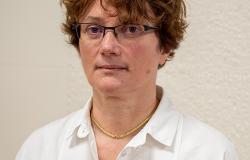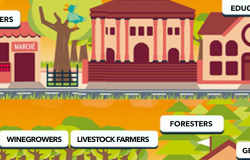Reading time 3 min
INRAE committed to opening science to all
Published on 22 December 2020

Dealing with the far-reaching, societal issues that affect agriculture, food and the environment — INRAE’s core research areas— requires concerted action by many people across diverse disciplines. This means creating and using many kinds of knowledge, from beyond the confines of a single lab or country. To this end, INRAE has used open science to inform its scientific strategy and strengthen its leadership position internationally.
Advancing knowledge, and more, by opening science
“Making our data accessible and reusable is the best way to advance knowledge.” Odile Hologne
Open science is a movement that aims to involve new stakeholders, such as everyday citizens and non-research organisations, in the research process, and to make the products of research — everything from scientific publications and data or software programs — more accessible and reusable. With science now coming under question in some quarters, opening research and becoming more transparent should, in theory, bolster confidence in it. Making science more accessible does not, however, mean appropriating research by citizens. This is why INRAE is developing a holistic approach to open science that includes disseminating knowledge and scientific findings to different audiences (experts/non-experts), building trustworthy relationships with stakeholders in third-sector research,1 not‑for-profit associations in particular, and involving additional stakeholders throughout the research process. INRAE feels that participatory science and research is a way for citizens to be more involved. Opening science also means rethinking how researchers carry out their work, both in terms of publishing their findings and their data, but also in terms of making use of data produced by others. The move towards open science also raises a number of questions: How are research projects designed? How are research findings and INRAE data used? What value is created by third parties? What impact does opening INRAE data, or INRAE software, have?
The Directorate for Open Science oversees INRAE’s work in open science
Since its establishment on 1 January 2020, INRAE has had a Directorate for Open Science (DIPSO) to support researchers and to facilitate the move towards open science. The Directorate brings together a number of different stakeholders working in knowledge dissemination, the science–society relationship and digital change, which is transforming the work environment for researchers. DIPSO is a research support division under the aegis of the Directorate General for Science and Innovation. Its work focuses on four areas: knowledge use and dissemination; digital technology in science; information analysis; and science in society.
DIPSO’s mission is to:
- develop and manage INRAE’s open science policy;
- build advisory capacities and support to decision-making for INRAE’s scientific management team, particularly though monitoring and scientometric services;
- contribute to opening research and research findings, including opening them to civil‑society stakeholders;
- manage data governance and contribute to the development of INRAE’s e‑infrastructure by putting in place services adapted to departmental needs;
- support skills development in researchers, DIPSO staff members and in staff working in associated fields, including in scientific and technical information, publishing, centres for automation and data management (CATI), and for data officers, Science in Society correspondents, etc.

Link
Odile Hologne, an ambassador for open scienceSince the start of her career, Odile Hologne, director of INRAE’s Directorate for Open Science (DipSO), has always been motivated by her desire to disseminate knowledge within and outside of the scientific community. For Odile, the best way to do this is with new information technologies and a healthy dose of enthusiasm.
Developing a data governance framework
Simplifying and improving access to research data will raise the quality of work produced by the entire scientific community, across all disciplines. France’s ministry for higher education, research and innovation set a policy on scientific data produced by research institutions. To that end, INRAE is taking action to achieve its open-science policy goals. As soon as the Institute nominated Hadi Quesneville as its Chief Data Officer in spring 2020, it set up a data governance unit. The unit prepares reference documents that are provided to INRAE researchers. The unit’s reference document on data governance sets out principles for managing and sharing scientific data. These reference materials supplement data.inrae.fr, an open-access data repository and directory.

Link
Hadi Quesneville and the art of dataBig data, open science, open data — data are taking an increasingly important role, as much in science as in everyday life. Hadi Quesneville is one of the first Chief Data Officers to be appointed by a research institute in France. He speaks about his new role in this burgeoning field and discusses the issues facing open science today.
Opening science to citizens
At INRAE, more than 100 research projects have included work done by non-scientists. Their involvement varies considerably, ranging from collecting data to directly participating in the research process. When civil-society stakeholders participate in INRAE research — whatever the level of involvement — it builds connections between science and society. It brings science closer to public expectations, and allows society to have a better understanding of the scientific process, its limitations and the rigour involved in scientific research.

Link
Participatory science and research at INRAEINRAE and other French research institutes are currently carrying out a broad range of citizen science projects. This work aims to address consumers’ growing concerns about various health, dietary, and environmental issues. It also encourages exchanges between science and society, increasing the general public's understanding of how research is done.
[1] Third-sector research refers to research, innovation and knowledge-production carried out by non-market actors (associations, unions, governments), not-for-profit actors (social enterprises, trade associations) and small, for-profit organisations (self-employed individuals, agricultural cooperatives, small-scale producers).
